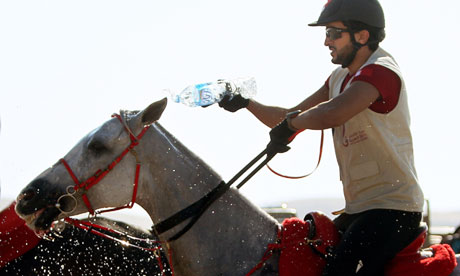Nasser Bin Hamad Alkhalifa
Testimonies of Victims of Abuse
After the crackdown on
the pro-democracy movement in Bahrain reports have been received from victims
stating that they were subjected to severe beatings and torture by people they
identified as members of the Bahraini royal family. Five members of alkhalifa
have been specifically mentioned by victims
Swedish Citizen tortured
by Nasser Alkhalifa, son of King Hamad
After the
crackdown on the pro-democracy movement in Bahrain reports have been received
from victims stating that they were subjected to severe beatings and torture by
people they identified as members of the Bahraini royal family. Five members of
Alkhalifa have been specifically mentioned by victims, they are: Noura Bint
Ebrahim Alkhalifa, Khalifa Bin Ahmed Alkhalifa, Khalifa Bin Abdulla Alkhalifa
and sons of the King, Khaled Bin Hamad Alkhalifa and Nasser Bin Hamad
Alkhalifa. One of the victims subjected to torture by Nasser Bin Hamad
Alkhalifa is Swedish citizen, Mohammed Habeeb Al-Muqdad, currently imprisoned
at Al-Gurain military prison.
Another
victim also testified that he was interrogated by Khalifa Bin Ahmed AlKhalifa,
who had a picture of the victim in a peaceful protest by the Ministry of
Information. The victim says he was asked repeatedly about his participation in
that protest, then was blindfolded, beaten and electrocuted on his genitals.
In another
case, three of the activists arrested and sentenced for attempting to overthrow
the regime also reported that they had been beaten by members of the royal
family. The first, Abdulla Isa Al-Mahroos, said he was beaten by Nasser Bin
hamad Alkhalifa, and that Nassar forced him to open his mouth then spat in his
mouth. Al-Mahroos was also beaten by Head of the Security Apparatus Khalifa Bin
Abdulla Alkhalifa. Who kicked him repeatedly in the stomach and ordered the
prison guards to walk over his stomach which caused internal bleeding in the
abdomen. Afterwhich Al-Mahroos was transferred to the military hospital
where he had two surgeries.
The second is
Swedish citizen Mohammed Habib Al-Muqdad, who was detained in an underground
prison in the National Security Apparatus in the Fort. Al-Muqdad recalls
that while being tortured suddenly everybody was silent. He heard his torturers
say “your majesty” someone asked him “do you know who I am?” When Al-Muqdad
said no, his blindfold was removed and the man infront of him said “I’m Prince
Nasser Bin Hamad Al-Khalifa. When you protested outside our castle in Safriya,
only a wall separated us”. Then Nasser asked Al-Muqdad what chants he had said
that day at the protest. When Almuqdad said “Down Down Hamad” Nasser slapped
Al-Muqdad who fell to the ground, then with the help of torturers beat him
severely.
There is a
wealth of evidence confirming that, at the very least, the government and the
ruling establishment had knowledge and condoned the actions of the security
forces. The most notable example of this is the actions and speeches of Nasser Al Khalifa , the son of the reigning monarch. In a public
forum, on state television, Nasser Al Khalifa threatened retribution to all
those involved in the protests regardless of their position in society and
their profession. In a telling final statement, Nasser Al Khalifa noted that,
as an island state, those involved in the protests in Bahrain had “nowhere to
escape too”. If any doubt could be attributed to his unequivocal assertions,
such doubt would be obliterated by the actions of the government and the
personal actions of Nasser Al Khalifa. Within a few hours of this statement,
the systematic targeting of athletes involved in the
protests commenced. To compound this, Nasser himself became personally involved
in the torture.
Mohammed
Hassan Jawad (64 yrs old) was blindfolded and handcuffed when Nasser Bin Hamad
asked him “do you know who I am, its Nasser with you” Then the son of the king
started interrogating Mr. Jawad about the Safriya protest and accusing him of
organizing the protest. To force him to confess, Nasser beat Mr. Jawad with a
hose on his head until he fell to the ground. Then Nasser started kicking him
mostly on his back, while swearing at shia clerics and imams.
Al-Safriya checkpoint
Different
victims beaten at tha Al-Safriya checkpoint (close to the palace of the king)
gave their testimonies but asked we do not share their names out of fear for
their safety. The first is a bus driver who was driving high school students
when he was stopped under gun point by the Bahraini army at the checkpoint. He
was shocked when Nasser Bin Hamad, son of the King, came wearing a military
uniform and started beating him. The victim says Nasser never used his hands
but kicked him, in sensitive areas, in his head and chest, and mostly on his
face until he started bleeding. When soldiers told Nasser that they would beat
him, Nasser replied “No leave him to me”. After severe beating the victim was
arrested for two weeks until the marks on his body faded.
Many other
victims came forward but were afraid they would be targeted if they spoke out
and asked us not to include their accounts in our report. Putting members of
the royal family in the positions of torturers and interrogators has only lead
to more mistrust and anger towards the monarchy.
Evidence of Nasser Alkhalifa leading security services
during crackdown on protesters in Sitra.
Nasser Alkhalifa on national television threatening all
those who revolt against the regime.
http://www.bahrainrights.org/




